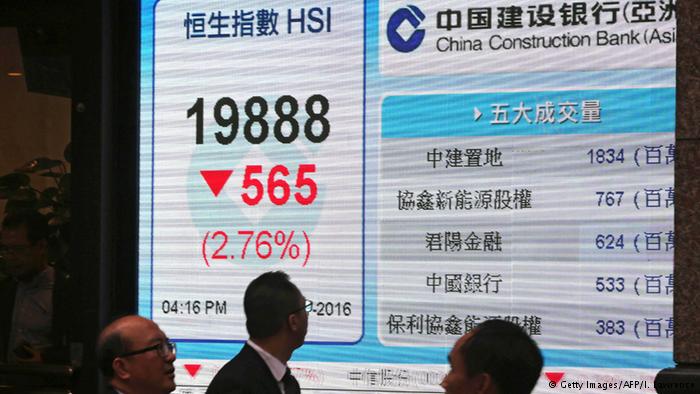Interview
Wuttke, “China is not good in crisis management”
The Chinese economy is growing as slowly as it has been for a quarter of a century not more. The President of the European chamber of Commerce in Beijing, and Joerg Wuttke, warns in the DW-interview quick reforms.

DW: Mr. Wuttke, the stock market falls, the growth is weakening. Is the Chinese economy in crisis?
Wuttke: so Far it was so, that the stock market is actually not at all to the real growth had directed. We had ten years of ten percent growth, and then, since June 2014, there was at once a bull market on the stock exchange in Shanghai. The corresponding Index rose within a short time of around 150 percent. Now he is again on the way there, where he once came. There is mainly a psychological Problem with the stock market, while the real economic growth is currently relatively strong. But for 2016, I see, in this respect, major problems.
Numbers, the economic growth concern in China, mostly from the state set. Do you have the feeling that the government is so slow to control, so it is important, get lost?
No, the control of the government is not at risk. You have a very strong Politorganisation – the party has at least 80 million members, across the country is very tightly organized. We run on the Congress in the next year, there is certainly the control is still energized. The country has deep pockets to economic uncertainties relatively quickly to iron out. Some provinces are already de facto slipped into a recession, and even there you will notice no riots or any larger casseroles. But to keep a hold on, the party will certainly be quite expensive.
Now what does this whole complex situation for European or German companies?

Jörg Wuttke
We are in the last few years, pampers have been, because China is extremely strong growth. This year China will in the manufacturing industry; certainly to the Null move around, what the growth is concerned. Much will depend on the service sector, in which most Europeans do not strongly represented. In addition, the indebtedness of firms and local governments. But even if there is a reasonably well-run in some areas, there still remains the question of whether we play there or not. We must not forget that The regulatory requirements of the Chinese side, are so comprehensive, that our chamber of Commerce to do this in a 400-page catalog 800 individual cases of lists.
Is above all the German export-oriented industry of these problems is affected, or there are those companies, the local produce?
Half of the European Exports to China come from Germany. By flagging growth and the simultaneous devaluation of the Renminbi, it will certainly more difficult, there to export. We are, as investors, very strong position in China. But that is also something to go back. According to the Figures for 2015 were it up to nine billion euros from European investors in China were created. At the same time, the Chinese in Europe, 22 billion euros are to be invested. And this Trend will continue. Currently, Europe is a more interesting investment destination than China.
The infamous Währungsspekulant George Soros has recently at the world economic forum in Davos on the Chinese currency is expressed. There was talk of a “hard landing” for China this year, experience will. How do you rate it?
Soros is just famous and, unfortunately, the Chinese government has been his statements recorded and on the first page of the newspaper “People’s Daily”, the largest and most important daily newspaper in China. That Soros is on the first page of People’s Daily kin, has led in turn to a great article on the first page of the “Financial Times”. At this time, then had each Dorfdepp in the last corner of the world understood that China’s Renminbi is a Problem that has. Unfortunately, that was extremely clumsy of the Chinese leadership, Soros in this Form to the pillory and now you have to just see how the world reacts to it.
China is the main developing country for us. Even if the Chinese economy just five percent, is growing, in absolute terms, still more than ten percent growth a decade ago . The base is simply much larger. And de facto, there is no second China to the world. Where we want to because, otherwise, still these big shops make? In India? It takes certainly 20 years, before the Indians following in the footsteps of China. That is why we are extremely interested in China’s reforms really put them into practice and at the same time stops, this almost silly front pages against Soros . That doesn’t help.
We look briefly into the future. Where is China in five years?
China is certainly one of two difficult financial years. I assume that then the good of the reform programme, the end of 2013 has been released, finally being tackled. The consumption in China has still a relatively low importance. When considering the Per capita consumption of all kinds of goods, you will very quickly clear: China is now where Korea was once in the 1970s and Japan in the 1960s were. There are still 20, 30 strong years in the System is feasible and realizable. The only question is, how is China to a crisis? Because China is not particularly good at crisis management.
The interview was conducted by Klaus Ulrich
Jörg Wuttke lives since 1993 in China. Since April 2014, Wuttke for the second Time President of the European chamber of Commerce in China – an office that he already from 2007 to 2010 and had held.
